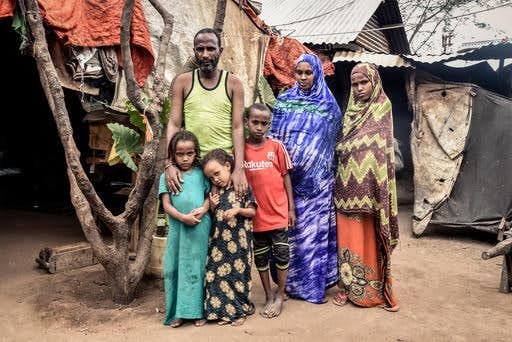MSF Report
Dimming prospects of lasting solutions amid continued insecurity in Somalia and ever-shrinking resettlement slots have locked refugees in Kenya‘s Dadaab camps in conditions of vulnerability and dependency.

With severe mobility constraints and limited livelihood options, humanitarian assistance continues to be a vital lifeline for refugees. But surviving on a bare minimum of assistance means many have been living on the threshold of an emergency for close to three decades now. Their needs far outstrip what dwindling humanitarian assistance can provide for in the face of waning donor funding.
Janai Issack was 10 years old when she moved to the camp with her family in 1991, fleeing violence in Somalia.
“A lot has changed over the years: I got married, bore children here, and we all live together in this compound,” she says. “Life was better when we first came to the camp. The safety we found in this place was a great relief compared to what was happening in Somalia, and the support from the aid organisations was good.”
Janai laments that, over the years, the quantity and quality of services offered to refugees has diminished.
“The food rations provided have reduced. Now we are given very little food that barely lasts a couple of weeks,” she says. “The classes in schools where our children go to are overcrowded, unlike those days when I used to go to school.”
“I think UNHCR is fatigued. I don’t know why they keep asking us if we want to go back to Somalia, yet our answer is always the same: No. Resettlement has also changed over the last year, it’s like no one goes anymore.”
Many refugees in Dagahaley – one of three camps that collectively constitute the Dadaab refugee complex, with a population of about 75,000 – share similar stories. They complain of the declining humanitarian support, notably food rations.
n September, the World Food Programme was forced to further reduce the general food distribution in the refugee camps to 70 per cent of the normal rations, due to severe funding constraints. This will most likely adversely impact the health condition of the refugees, as Médecins Sans Frontières (MSF) has witnessed in past years.
“For most people, life in the camps is all they know,” says Dana Krause, the country representative for MSF in Kenya. “But living in camps for three decades with little food, lack of specialised healthcare and no jobs, or measly remuneration for work done, is nothing short of an assault on human dignity.”
For 65-year-old Abdia, who fled Somalia for Dadaab in 1991, life in the camps has worsened over the years.
“If I compare my life now to the way it was two decades ago, things were much better then. The food rations are very small so if you’re someone my age with no one to take care of you, you’ll find life very difficult,” she says. “Our movement is restricted, and the services have immensely reduced.”
For undocumented refugees, the struggle to access basic services in the camps is even more daunting. According to UNHCR, there are at least 15,000 unregistered asylum seekers in the Dadaab complex and only around half of them receive food assistance based on a vulnerability assessment.
Although unregistered refugees can access MSF health services in Dagahaley, for most other basic needs, including shelter and clothing, they are largely left to fend for themselves.
Deteriorating mental health and the struggle for specialised healthcare
Others, like 42-year-old Abdo Mohamed Geda, who came to Dadaab in 2011, have taken to doing menial jobs to supplement what little food rations they receive. Abdo fetches firewood on donkey carts to support his family of eight children.
“Children need milk, food and clothing,” he says. “Every morning I go out to search food for my family. But when there is nothing, it stresses me. I can’t sleep.”
Read more: Shut out and forgotten, refugees in Dadaab appeal for dignity
Source: MSF


